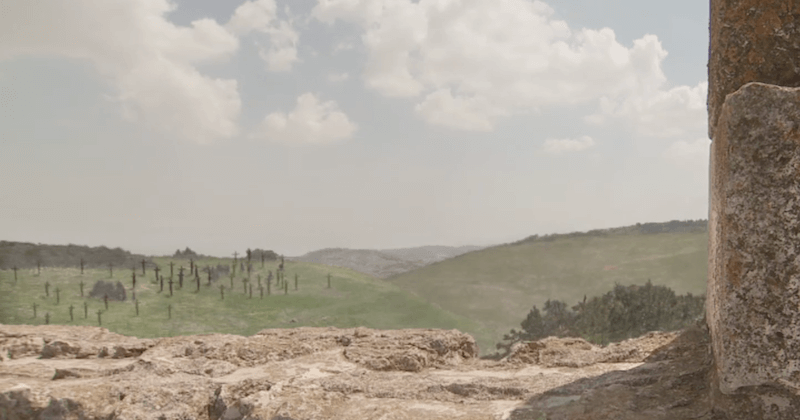In my public speaking career, I’ve been interrupted just three times. Once in the Manning Bar at Sydney University, during my band days. I was trying to introduce a song about God’s love, and people in the front row threw beer cans at me. One hit me right in the head, so I went on with the song straight away. The other was in a country pub where a woman interrupted my talk on God’s love by yelling out, “How can you speak of God’s love when he takes people from our lives?” That led to a very interesting conversation. But the third time was in a lovely Anglican church in Sydney at the traditional early morning service. You’ve got to imagine this wise, prayerful, orderly congregation singing hymns and saying the ancient liturgy.
I was giving a simple exposition of the Old Testament book of Isaiah chapter 58, part of which says, “Provide the poor wanderer with shelter.” I said, and I’m quoting my actual sermon notes that I dialed up here, “Did you notice the reference to refugees in verse seven, ‘Provide the poor wanderer with shelter?’ I don’t really mind what side of politics you are on or what you think the practical solution is. But I will say that a Christian must not care more about border security than about asylum seekers.” No sooner had I got out words “asylum seekers,” than a well spoken gentleman yelled out from the pews, “They’re not asylum seekers, they’re illegal boat arrivals.” I didn’t respond. I just paused and repeated my line. “A Christian must not care more about border security than about asylum seekers.”
And sure enough, he yelled out the same thing. “They’re illegal boat arrivals.”
I moved on. And it just so happens that my very next lines went on to quote the oldest part of the Anglican prayer book, what’s called the litany. A series of short prayers to God for help. The bit I quoted goes like this. “Defend and provide for the widowed and the fatherless, the refugees and the homeless, and all who are desolate and oppressed. Hear us good Lord.” My interlocutor in the pew stayed quiet. Anglicans don’t like to contradict the prayer book.
Anyway, the experience showed me just how political the topic of refugees can be. It can even inspire a traditional Anglican to yell out in the church service. Even though it’s a clear topic of consistent teaching in the Bible, some people struggle to hear anything about this theme without thinking of it as a partisan ploy.
The same thing happens when you make the point that Jesus himself was, for a time, a refugee. The famous Christmas story in Matthew chapter 2 says that king Herod killed the infants of Bethlehem in an effort to hunt down the newborn messiah. And Joseph and Mary, his parents, flee with the baby Jesus to Egypt, 500 kilometers away. Now the point can be overplayed for sure, but the overreaction is just as real.
I read an article just the other day titled Jesus Was Not a Refugee. The author opens with these words. “It has become routine at this time of year, Christmas, for activists, social justice warriors, religious leftists, and others to seek to politicize the Christmas story. And one key way to do this is to make the claim that Jesus was a refugee asylum seeker in another country.” The author goes on to say there is no way Jesus can be considered a refugee. He’s got two main reasons. One, Jesus never left the Roman empire, so he pretty much just moved around in one sovereign territory. And two, he was only there temporarily, so that’s not really refugee status.
According to Matthew chapter 2, after Herod died, Joseph was urged in a dream to return to the holy land. They went up to Galilee rather than Judea. This reads to me like a pretty motivated retelling. There’s no way you can think of Jerusalem, and Alexandria down in Egypt, which is where Jesus probably went, as basically the same country just because they’re both subjugated to Rome. That’s not really how the empire worked. I think we can safely say that if a king like Herod has no jurisdiction in Egyptian Alexandria, and he certainly didn’t, then Alexandria is, to all intents and purposes, an entirely different country.
And the reference to this being temporary changes nothing. The thing that allowed the holy family to return to the holy land was that the threat had passed with the death of king Herod. Imagine Herod had survived and continued his grudge against the messiah’s family. You can be sure that this family would’ve settled down in Egypt.
And that’s the thing. The families I met in the camps in Jordan and Lebanon simply can’t return. Their villages have been destroyed or overtaken by rival factions. My friend Akram might not have ISIS to contend with anymore, but Syria is still in disarray. President Bashar al-Assad is no less brutal against perceived traitors. And Akram knows that his extended family’s homes and belongings have all been acquired now by others. Five years later, Akram and his family are still in Egypt, you could say, with the holy family, and angry Herod still rules. Refuge is exactly what we have to offer them.
by John Dickson
Refuge
Want to hear the rest of the episode?
Check out episode 59: “The Refugee”











































